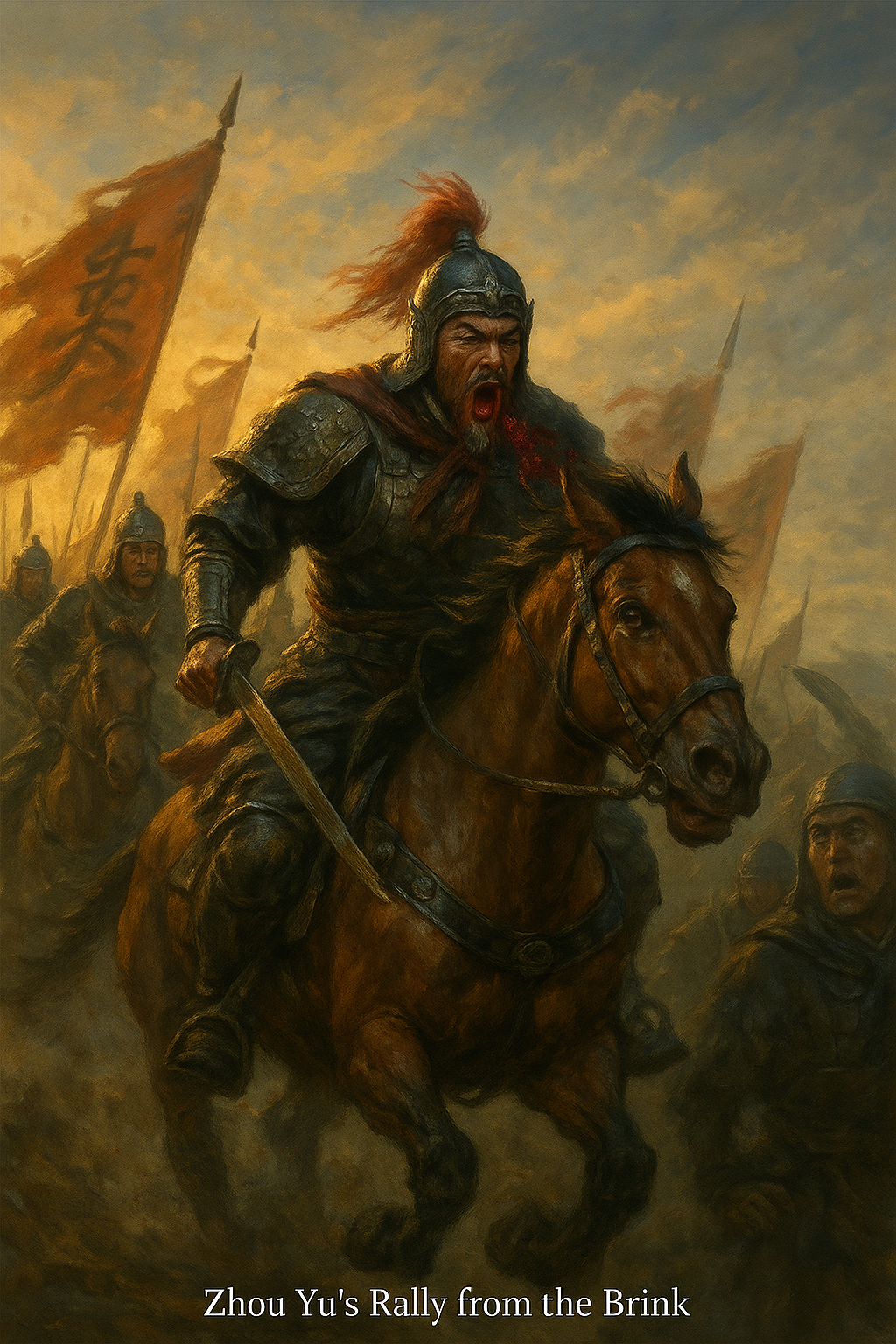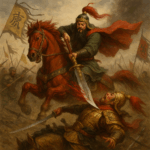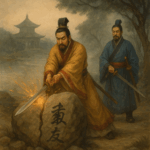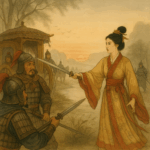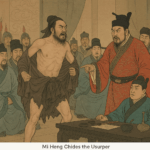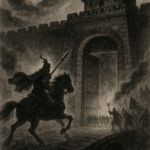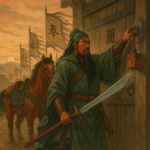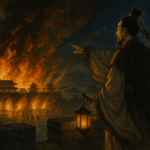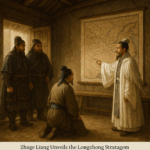When Zhuge Liang prepared to execute Guan Yu for his disobedience, Liu Bei interposed: “When the three of us swore brotherhood, we pledged to live and die together. Though Yu has broken the law, I cannot betray that oath. I beg you, Lord, to forgive him this once and allow his merits to atone for his fault.” Moved, Zhuge Liang relented and spared his sworn brother.
Meanwhile, Zhou Yu assembled his officers to give out promotions and commendations, then reported each man’s achievements to Sun Quan. All surrendered troops were dispatched across the river, and a grand feast was held to reward the army. With preparations complete, Zhou Yu advanced to capture Nan Commandery. His vanguard camped on the riverbank in five divisions, and he himself took station at the center command post. As generals debated strategy, a messenger announced: “Liu Bei has sent Sun Qian to pay respects to the Commander.” Zhou Yu bade him enter. After the formal greetings, Sun Qian presented a modest gift, saying, “My lord sent me to thank you for your extraordinary merit toward us.”
Zhou Yu inquired, “Where is Liu Bei encamped now?” “At Youjiangkou,” Sun Qian replied. “Is Zhuge Liang with him?” Zhou Yu asked in alarm. “The Chancellor is indeed there under Liu Bei’s command.” “Tell him I will come myself to offer my gratitude,” Zhou Yu ordered, dismissing the envoy. Turning to Lu Su, he confessed, “If Liu Bei’s forces at Youjiangkou seek to seize Nan Commandery, all our toil and treasure will be for naught. I cannot allow him to take it before I do!”
Lu Su asked, “What plan do you propose?” Zhou Yu smiled, “I shall ride out and speak with him. If I can dissuade him, well and good; if not, I will settle with Liu Bei before he can strike.” Lu Su volunteered to accompany him. Mounted with three thousand light cavalry, they rode through the night to Youjiangkou.
Sun Qian returned to report to Liu Bei that Zhou Yu intended a courtesy visit. Liu Bei asked Zhuge Liang, “What might be his purpose?” Zhuge Liang laughed: “He comes not for gifts but for Nan Commandery.” Liu Bei wondered, “If he brings his troops, how shall we respond?” “Do exactly as follows,” Zhuge Liang advised. At the river mouth, Liu Bei arrayed his warships on the water and cavalry on shore. When Zhou Yu and Lu Su arrived, Zhao Yun led a handful of horsemen to escort them into Liu Bei’s pavilion. After formal salutations and a banquet, Zhou Yu remarked, “General Liu, you have brought your army here—surely to seize Nan Commandery?”
Liu Bei replied, “I heard you planned to take it; so I came to assist you. If you do not claim it, I shall.” Zhou Yu laughed: “Eastern Wu has long coveted the Han River; with Nan Commandery in our grasp, how could I leave it to you?” Liu Bei responded, “Victory is never assured. Cao Cao has left Cao Ren to defend the county—he is a cunning commander and fearsome warrior. I only worry you may fail.”
Zhou Yu retorted, “If I fail, then you may have at it!” Liu Bei protested, “Zhou Gongjin and Zhuge Liang stand ready to attest my word—do not regret this decision.” Lu Su hesitated, but Zhou Yu continued, “A man’s word is his bond. I shall not balk!” Zhuge Liang interjected, “Your promise is sound. Let Wu take it first; if you falter, then General Liu may have his turn.”
With that, Zhou Yu and Lu Su bade their hosts farewell and rode back to camp. “Why did you allow Liu Bei to claim Nan Commandery?” Lu Su asked. Zhou Yu admitted, “To make a show of magnanimity—but now I appear weak. We must strike first!” He called for volunteers: “Who among you dares to seize Nan Commandery?” Jiang Qin stepped forward. Zhou Yu appointed him vanguard commander with five thousand elite troops to cross the river at dawn; he himself would follow in support.
At Nan Commandery, Cao Ren had stationed Cao Hong at Yiling as a flanking garrison. When scouts reported Wu’s forces crossing the Han River, Cao Ren commanded, “Hold the city—do not engage.” The valiant Niu Jin protested, “To stand idle with the enemy at our walls is cowardice. Though our forces are shattered, I volunteer five hundred men to fight to the death.” Cao Ren assented and sent Niu Jin and his five hundred against Ding Feng’s troops. After four or five exchanges, Ding Feng feigned retreat, luring Niu Jin’s men into an ambush.
Surrounded, Niu Jin fought fiercely but could not break free. From the battlements, Cao Ren donned his armor, rallied a few hundred horsemen, and charged into the fray. He fought his way to the heart of the encirclement and rescued Niu Jin. As they sought to withdraw, they clashed with Jiang Qin’s returning column; both sides fought desperately before Cao Ren and Niu Jin broke through and returned to the city. Although victorious, their losses were heavy. Jiang Qin reported his defeat to Zhou Yu, who raged at him—but officers intervened to spare Jiang Qin’s life.
Zhou Yu summoned his generals, intent on personally crushing Cao Ren. Gan Ning counseled patience: “Cao Hong’s garrison at Yiling is the key. Send three thousand men to capture it first; with that flank secured, we may easily take Nan Commandery.” Zhou Yu agreed, dispatching Gan Ning with three thousand troops to Yiling. Covert scouts reported their approach to Cao Hong, who conferred with Chen Qiao. Chen Qiao urged, “If Yiling falls, you cannot hold Nan Commandery. You must relieve it quickly.” Cao Ren sent Cao Chun and Niu Jin with reinforcements.
As Gan Ning attacked Yiling, Cao Hong sallied forth to meet him. Their fight lasted over twenty rounds before Gan Ning forced Hong to retreat, and Yiling fell to Wu. At dusk, Cao Chun and Niu Jin arrived, surrounding Yiling again. Alarmed, Zhou Yu’s staff urged splitting his army to rescue Gan Ning; Zhou Yu refused, deeming the main camp too exposed. Lu Meng argued, “Gan Xingba is a great general of Wu—how can we abandon him?” Zhou Yu relented: he left Ling Tong with ten thousand men to hold the camp and led the rest to Yiling. He also dispatched five hundred troops to fell trees and block the narrow escape routes, hoping to capture enemy horses.
At Yiling, Zhou Yu asked for a volunteer to break through to Gan Ning. Zhou Tai charged forth with blade in hand, cut through the Cao line, and reached the city gates. Gan Ning rode out to meet him, and Zhou Tai reported, “My lord leads the army himself!” Gan Ning ordered the defenders to stand fast.
Meanwhile, Cao Hong, Cao Chun, and Niu Jin learned of Zhou Yu’s relief force and sent word to Cao Ren. Cao Ren split his troops to make a stand. As Wu forces arrived, Gan Ning and Zhou Tai attacked from two sides, sowing confusion. Cao’s soldiers panicked and fled down narrow lanes blocked by the felled trees—dozens of them abandoned their mounts. The Wu troops seized over five hundred horses.
By starlight, Zhou Yu’s army reached Nan Commandery, coinciding with Cao Ren’s relief force from Yiling. Both armies clashed fiercely until late at night, then withdrew for the evening.
Inside the city, Cao Ren convened his officers. Cao Hong suggested consulting Cao Cao’s contingency plan. Cao Ren produced the written orders and, delighted, commanded his troops to cook at the fifth watch and at dawn empty the city, leave the banners flying, and sally out by three gates to feign defense. His men obeyed, cutting their ropes and abandoning the walls.
Meanwhile, Zhou Yu’s forces bivouacked outside Nan Commandery. He climbed the observation tower and saw the empty walls dotted with flags, the defenders under orders to await attack. He formed his army into left and right wings: whichever wing broke through, the other was to press the attack until the trumpet sounded the signal to retire. He gave Cheng Pu command of the reserve, while he himself led the storming column.
At the southern gate, Han Dang charged out and engaged Cao Hong in deadly combat for over thirty exchanges before Hong was forced to fall back. Cao Ren then rode out to meet Zhou Tai, but after ten passes of arms, he too was driven in and retreated. As the flanks surged forward, Cao’s lines collapsed. Zhou Yu personally led the pursuit to the city walls. He ordered the troops to seize the open gates and pour into the inner ward. Chen Qiao, watching from the walls, cried, “The Commander’s strategy is divine!”
But as the lead stormers entered, hidden archer pits opened fire, raining bolts down upon them—many fell into traps. Zhou Yu spurred his horse to turn back, only to be struck by a poisoned bolt in his left side; he fell from his mount. Niu Jin, Xu Sheng, and Ding Feng fought through to rescue him, driving off the attackers and carrying him back to camp. His wound festered and fumed with poison; the army physician warned that any anger or exertion would reopen it. Cheng Pu ordered strict watch over the defenses and forbade any commander from reporting the enemy’s daily taunts, lest Zhou Yu’s blood boil.
On the third day, the enemy general Niu Jin rode up to the camp gates and jeered for Zhou Yu to come forth. Cheng Pu and the officers debated withdrawing temporarily to treat his wound. But one morning, with Cao Ren’s drums sounding, Cheng Pu balked. Zhou Yu summoned him to the pavilion and demanded, “Why have you concealed their insults from me?” Cheng Pu confessed that he feared arousing Zhou Yu’s fury.
Zhou Yu leapt to his feet: “A man who draws a government stipend must be willing to die on the battlefield and be wrapped in horsehide. How can I shirk the cause for one man’s wound?” Throwing on his armor, he mounted his steed and rode out with several hundred horsemen. Seeing him advance despite his grievous wound, Cao Ren unleashed a volley of insults: “Coward Zhou Gongjin, you dare not face me!” As the taunt died on his lips, Zhou Yu thundered from among his riders, “Cao Ren, you cur!” The enemy ranks recoiled in fear, and Cao Ren ordered his men to return the jeers.
Enraged, Zhou Yu sent Pan Zhang at them—but in the clash he spat blood and collapsed from his horse. The Wu officers formed a defensive line around him, fighting back wave after wave of Cao’s infantry until they could carry him to safety. Back in camp, Cheng Pu reminded his fellows of his promise: “This was my plan—to fool Cao Ren into thinking our commander was dead. Let our hidden troops spread the word that he has died of his poisoned wound. Tonight, when Cao Ren attacks, we shall spring our trap and capture him at a single blow.” The officers marveled at the genius of the strategy, and woo cries of mourning rang through every tent.
Inside the enemy camp, Cao Ren’s council debated Zhou Yu’s fate. As they plotted to seize his corpse and carry his head to Xuchang, surrendered Wu soldiers under oath reported: “Zhou Yu’s wound burst; he retired to his pavilion and died. All his generals hang mourning crepe.” Cao Ren rejoiced and dispatched Niu Jin as vanguard, Cui Qiao to lead a small force, and Cao Hong and Cao Chun in reserve. Led by a forlorn drumbeat, they sallied forth at midnight for Zhou Yu’s camp.
They found the camp eerily silent and the tents deserted save for banners. Alarmed, they turned to flee—but at that moment fire arrows, cavalry charges, and infantry assaults burst from all sides: Ding Feng and Jiang Qin fell upon them from the east, Zhou Tai and Pan Zhang from the north, Xu Sheng and Ding Feng from the south, and Chen Wu and Lu Meng from the west. Cao Ren’s force was smashed to pieces; only a dozen or so riders escaped. Cao Ren and Niu Jin fought on valiantly but were forced to surrender that night’s worth of land.
At dawn, Zhou Yu and Cheng Pu rode back to Nan Commandery and saw Red Hare’s rider atop the walls—Zhao Yun himself: “I have taken the city under General Liu’s orders.” Furious, Zhou Yu ordered the assault. Arrows rained down from the ramparts, forcing him to reconsider. He called off the attack and proposed a new campaign: “Gan Ning, take a few thousand troops to seize Jingzhou; Ling Tong will lead several thousand to Xiangyang. Only after these two are secure shall we return to reclaim Nan Commandery.”
But before plans could be finalized, urgent dispatches arrived: Zhuge Liang had already seized Nan Commandery with forged army orders, and Zhang Fei had taken Jingzhou, while Guan Yu captured Xiangyang—all without firing a shot. “How did he gain Cao Ren’s seals?” Zhou Yu demanded. Cheng Pu explained: “He captured Chen Qiao and used his credentials.”
Zhou Yu cried out in pain as his poisoned wound burst anew:
“For which of these cities have I toiled in vain,
Through all these hardships, to what end?”
His fate—and that of the Wu army—remained uncertain.
